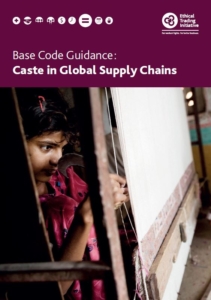Is your business operating in, or sourcing from, a caste affected country?
Business operations in caste-affected countries are at a high risk of being based on the economic exploitation or seclusion of caste-affected communities and others at the “low” end of the caste hierarchy.
Violations of both national legislation as well as international law, in particular the international labour standards, often occur.
How can your company avoid complicity?
If your company is either directly operating in or sourcing from a caste-affected country, your company could be complicit in the discrimination and exploitation of caste-affected communities.
Several tools exist to help you assess your business operations and remedy any harm done:
Ethical Trading Initiative Base Code Guidance on Caste in Global Supply Chains
The Dalit Discrimination Check is a web-tool developed specifically to help companies identify and prevent discrimination and exploitation of Dalits in their Indian operations and suppliers. It is designed as a comprehensive checklist with self-guided questions and indicators of possible violations of national Indian law and international law. It has been developed by the Danish Ministry of Foreign Affairs, IDSN and the Danish Institute for Human Rights as part of their Human Rights and Business Project.
The Ambedkar Principles are developed to assist foreign investors in South Asia. They include a set of employment principles as well as a set of additional principles adressing economic and social exclusion of Dalits.
ISO 26000 on Caste Discrimination. Caste discrimination has now been highlighted by the widely recognised standard – the ISO 26000 on social responsibility.
Read the IDSN submission to the Working Group on the issue of human rights and transnational corporations and other business enterprises on the first annual Forum on Business and Human Rights in connection with the public consultation on The Forum on Human Rights and Business in May 2012.

 caste guidance seeks to support businesses in understanding the risks posed by caste discrimination when their operations and supply chains stretch into caste-affected countries.
caste guidance seeks to support businesses in understanding the risks posed by caste discrimination when their operations and supply chains stretch into caste-affected countries.

